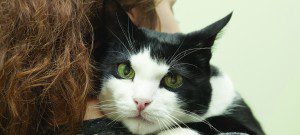By Dr John Rand, D.V.M.
 Thyroid disease is the most common endocrine disease of cats. As in people, the thyroid paired glands usually located just below the voice box. They produce various hormones that affect essentially every cell in the body. These hormones regulate the body’s metabolism of fats, carbohydrates, and proteins, heat production, and also increase the sympathetic nervous system (fight or flight response). In contrast to dogs whose thyroid levels are too low, cats with thyroid disease have excessive amounts of these hormones usually from hyperplasia or a benign tumor of the glands (70% of the time both glands are affected). While cats may present with any number of clinical signs as a result of thyroid dysfunction, many owners notice significant weight loss even though they have an excellent appetite. Weight loss with a good appetite is also commonly seen with many other equally common diseases of older cats, though (chronic kidney disease, diabetes, various cancers, etc.). Thankfully, for the majority of the time, the diagnosis is fairly straightforward with routine lab work.
Thyroid disease is the most common endocrine disease of cats. As in people, the thyroid paired glands usually located just below the voice box. They produce various hormones that affect essentially every cell in the body. These hormones regulate the body’s metabolism of fats, carbohydrates, and proteins, heat production, and also increase the sympathetic nervous system (fight or flight response). In contrast to dogs whose thyroid levels are too low, cats with thyroid disease have excessive amounts of these hormones usually from hyperplasia or a benign tumor of the glands (70% of the time both glands are affected). While cats may present with any number of clinical signs as a result of thyroid dysfunction, many owners notice significant weight loss even though they have an excellent appetite. Weight loss with a good appetite is also commonly seen with many other equally common diseases of older cats, though (chronic kidney disease, diabetes, various cancers, etc.). Thankfully, for the majority of the time, the diagnosis is fairly straightforward with routine lab work.
Losing weight and eating a ton sounds like a dream come true for some pet owners. What is so bad about that? Many hyperthyroid cats also develop chronic vomiting and diarrhea and can become debilitated quite quickly. Sometimes, though, the unseen damages are of the biggest concern. RRecalling that thyroid hormones affect virtually every cell in the body, we can see significant, varied problems arise with excess hormones in circulation – the most significant of which are high blood pressure and heart disease.
The unchecked damage wrought from these two processes can cause anything from kidney failure, blindness, heart failure, and sudden death. With early diagnosis and treatment, however, these effects can be managed or abolished outright.
Several options exist for the treatment of hyperthyroidism in cats. The most common way that cat owners today manage the disease is with twice daily administration of a medication called methimazole. Administration can be by mouth (with pills or liquid) or by applying a small amount of gel to the skin of the ear. As with all medications, side effects can occur, but are rare and typically mild. Once the pet is started on the medication, frequent lab results and blood pressure checks are needed to assess the thyroid levels and response to therapy.
A cure can be achieved with a single dose of radiation performed at a specialty facility. Initial costs are high, but the long term benefits are clear. Side effects are extremely rare. This treatment can only be used for cats that have not already developed secondary damage to their heart and kidneys. So, early detection and action is very important. The other method for a cure is with surgery to remove the thyroid gland(s) affected. Fewer and fewer owners elect this option, as the costs and risks to not outweigh the benefits of the other treatment modalities.
The newest means of managing hyperthyroidism in cats is with dietary therapy. Since thyroid glands require iodine to make their hormones, maintaining EXTREMELY LOW levels of iodine in the diet can prevent their overproduction. Until fairly recently, the means of preparing a diet with such specific requirements had been impossible. A prescription diet exists now that can treat these cats effectively. We see the same excellent results that we can attain with the medical management of methimazole, but with none of the side effects and without twice daily medication.
Similar, semi-regular blood pressure and blood tests are needed for monitoring purposes, as this dietary therapy will fail if the cat eats anything except for the prescription food. This means NO table scraps, no treats, no hunting bugs, lizards, frogs; the cat can eat nothing but the special diet. This can be difficult in multi-pet households or for owners who cannot stand the idea of their cat going without treats.
As with so many diseases, the combination of early detection and treatment with regular monitoring of thyroid disease should allow for a good to excellent prognosis for many pets.
The Animal Clinic
3300 Tamiami Trail
Suite 103
Port Charlotte, FL 33952
941-625-0742
theanimalclinic.net







